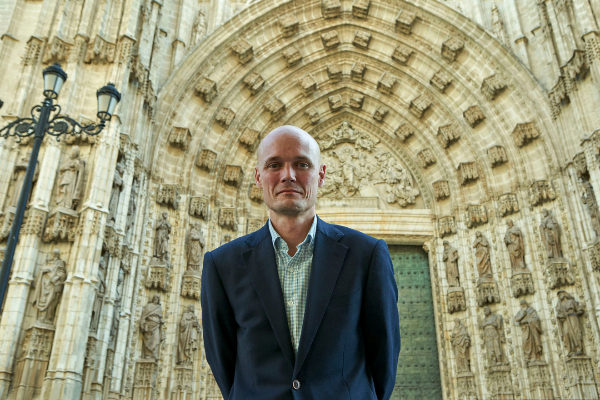- Read all the interviews of the counter
Edward Wilson-Lee . Mount Vernon, Ohio, USA, 1980. He grew up in Kenya among wild animals, but his passion is books, as well as the protagonist of his latest work 'Memorial of the Wrecked Books' (Ariel), where he tells the story of Hernando , the bastard son of Christopher Columbus.
How does your interest in Cristóbal Colón's illegitimate son, Hernando, born in Córdoba, result of the Admiral's relationship with Beatriz Enrique de Arana, I am Professor of Book History and Printing. When I learned about the history of Hernando Colón and his project of making a universal library, I was amazed because it is like an Eco novel or a story by Borges. Incredible, but true. A fascinating and little known story. Yes, it's weird, but Hernando was a man in the shade. What was Hernando Colón like? His most ambitious project was to build a universal library that contained every book in the world. It was parallel to that of his father. Admiral Columbus did not want to reach the Americas but go around the world. Her son Hernando wanted to go around the world of books, a circumnavigation of knowledge. He went 500 years ahead of Google Books. Yes, of course. In his day, his contemporaries did not understand. Most of the libraries included books by the great classical authors, manuscripts of great price ... but Hernando wanted to put everything together, because he not only acquired books, but also songs and blind sheets that peddlers sold in taverns, travel guides and even cookbooks. Yes, and the first newspapers, a music collection, perhaps the world's first botanical garden with 5,000 trees, a dictionary, a geographical encyclopedia, letters ... he was a man obsessed with books, information and the organization. Part of this treasure is guarded in Seville. Yes, of the 15,000 books in Hernando's library, in Seville there are about 4,000 or 5,000. They are in the Colombian Institution, inside the Cathedral. After his death, he left his books to his nephew Luis, but he was not interested. No one understood the value of this collection. The Sevillian Inquisition made an expurgo in this library in 1558. Yes, they removed the works of Erasmus. In the 19th century others were stolen. The legend of Columbus and the fans of the old book were very guilty. There are books in libraries around the world: in the United States, France, in private collections ... but those in Seville are, despite these looting, a jewel of humanity. Hernando signed up for the coronation trip of Carlos V in Aachen, but what he intended was to continue buying books. Yes, Hernando was a bit like the figure of Forrest Gump, present at every important moment in history, but his first obsession is the books. He traveled all over Europe to acquire books. This is one of the most exciting parts of the story. On those trips he sometimes bought a thousand books in two or three days because he wanted to fulfill this project before his death. Then, he sent them to the library he built in Seville next to the Guadalquivir River. Why has this story been in the shade all these years? It has been that way until we have seen the power of information technologies and algorithms of Google. If 30 years ago I go to a publishing house and tell them that I am going to write a book about library catalogs from the 16th century they would think it's a joke. Now it is easier because it is a story about information technologies and their power. He teaches at Cambridge, do you have any idea what can happen with Brexit? I hope nothing happens and fails. We have to stay together because apart we will be weaker. Both Brexit and Trump offer magical solutions for all of us to be rich, but they are lies. The problem is that there are people who want to believe these lies.According to the criteria of The Trust Project
Know more- Carlos V
- Europe
- Andalusia
- literature
- history
- Final Interview
The final interview Daniel Ruiz: "Politicians only read the speeches they write to them"
The final interview Susana Sueiro: "In the Valley of the Fallen there may have been buried more Republicans than Francoists"
The Paper Sphere Wolfram Eilenberger: "The identity issue must be taken from the extreme right"

